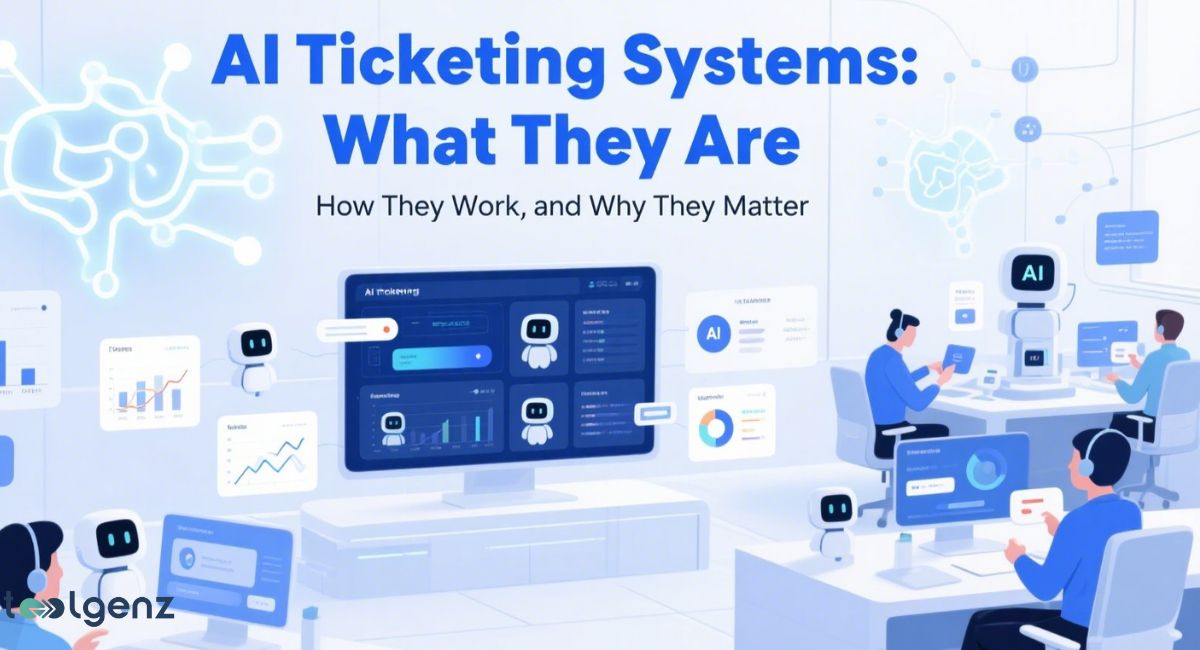In today’s fast-paced digital world, businesses need faster, smarter ways to handle customer support. That’s where AI ticketing systems come in.
AI ticketing systems use machine learning and natural language processing (NLP) to manage support tickets quickly and accurately.
With tools like smart ticket management and intelligent ticket routing, companies can reduce wait times, improve service quality, and increase customer satisfaction.
Unlike traditional help desks, these systems can analyze issues, prioritize cases, and even offer solutions using AI-powered support systems.
As more companies embrace AI in customer service, understanding how these systems work and why they matter is key to staying competitive in today’s market.
AI ticketing systems go beyond speeding things up—they redefine how customer support works.
From predictive ticket analytics to self-service support systems, AI ticketing is reshaping how support teams operate.
Businesses of all sizes can now offer faster, more personalized service without overwhelming their staff.
What is an AI Ticketing System?
An AI ticketing system is software that uses artificial intelligence to manage customer support tickets. Tickets are records of customer questions or problems.
When someone asks for help, the system creates a ticket, organizes it, and sends it to the right agent or solves it automatically. This is known as support ticket automation.
The system uses AI help desk software with tools like Conversational AI, Machine Learning (ML), and Natural Language Processing (NLP). These tools help the system understand the ticket, know the customer’s problem, and provide the right solution.
Many companies now use this technology for smart ticket management, including platforms like Zendesk AI ticketing and Salesforce Service Cloud AI.
AI-enhanced service desks not only speed up the resolution process but also ensure more accurate and consistent support.
With features like ticket triage automation and chatbot customer service, businesses can now handle a higher volume of requests without sacrificing quality.
Why is AI Ticketing Automation Important?
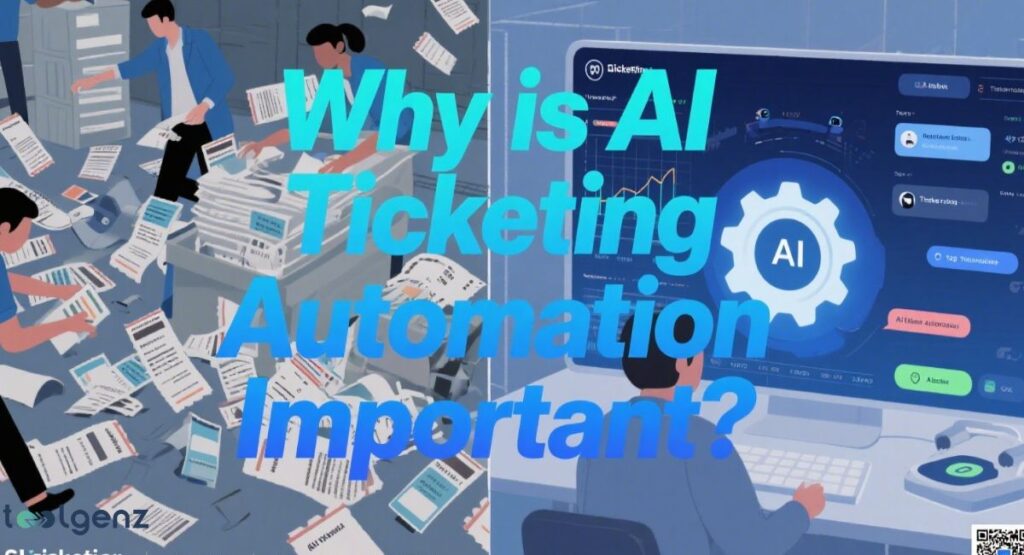
Customer support teams in the USA deal with more customer queries than ever. People want fast answers and help 24/7. AI customer support automation helps meet these demands.
With AI, businesses don’t need more staff. They just need smarter systems that handle tasks automatically. This saves money and time.
Automated ticketing systems are also important for keeping customers happy. They reduce wait times, solve issues quickly, and help agents work better.
AI tools like intelligent ticket routing, self-service support systems, and predictive ticket analytics improve the experience for both customers and support teams.
As support requests grow across channels like chat, email, and social media, AI makes omnichannel support integration much easier.
By using AI ticketing systems, companies can offer consistent service across all platforms, improving customer loyalty and satisfaction.
How Do AI Ticketing Systems Work?
When a customer sends a message, the system reads it using Natural Language Processing (NLP).
It then uses Intent Detection, Emotion Detection in Support Queries, and Semantic Search to understand what the customer wants. Based on this, the system creates and sorts the ticket.
Then, Automated Ticket Routing and Smart Escalation assign the ticket to the right agent. If it’s a simple issue, the system might answer automatically using Conversational AI bots or offer help from a virtual customer support agent.
If it’s complex, it sends it to a human. AI service desk integration ensures everything runs smoothly between the AI system and human agents.
Behind the scenes, ticket classification and ticket summarization help speed up the response process.
With real-time insights and helpful prompts, agents get exactly what they need—right when they need it—to respond faster and more effectively.
Key Benefits of AI Ticketing Systems
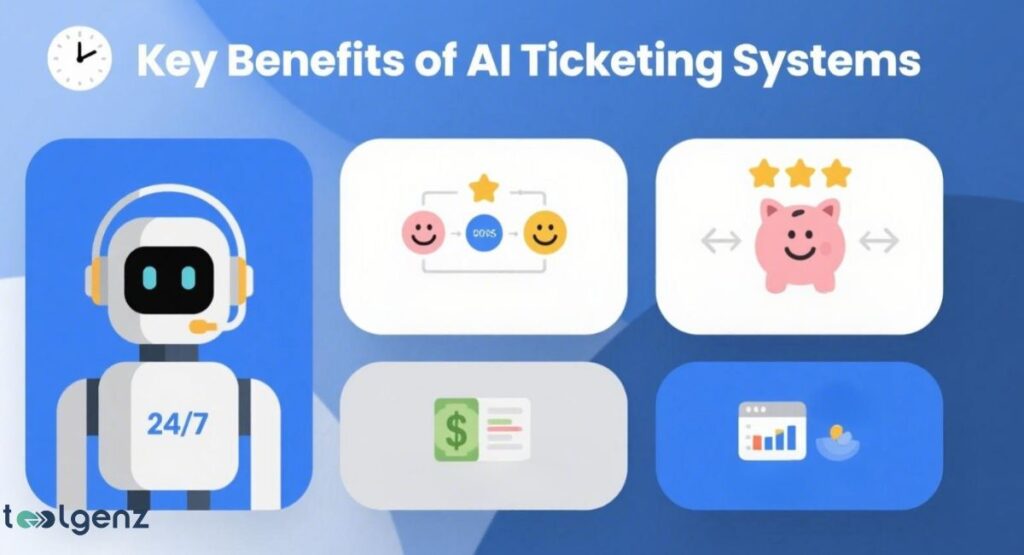
Using AI ticketing systems handling much faster. AI systems can answer simple questions right away.
They also make sure tickets go to the right person quickly using ticket triage automation and smart escalation. This improves the speed and quality of customer support.
Another benefit is better agent performance. With agent productivity tools, agents get help through personalized responses, agent assist prompts, and ticket summarization.
The system gives them suggestions and background info to solve issues fast.
Also, real-time analytics and SLA compliance monitoring help managers keep track of everything.
By handling repetitive tasks, these tools take the pressure off your team—freeing them up to focus on more meaningful customer interactions.
They also support self-learning AI models that improve over time, leading to fewer mistakes and faster resolutions as the system learns from each interaction.
Common Use Cases and Real-Life Examples
Many industries in the USA use AI in customer service today. In retail, AI helps with order issues, return requests, and FAQs.
In healthcare, AI answers appointment questions or shares lab results securely. In IT, AI help desk software handles password resets and system alerts.
For example, a U.S. e-commerce brand used chatbot customer service during the holiday season. The AI handled over 60% of all queries using Generative AI customer support.
Another company used CX automation platforms to boost resolution speed by 45% with automated case resolution.
These real-life examples show how support ticket automation can reduce costs, increase efficiency, and provide better service at scale.
Industries that once depended heavily on large call centers now rely on AI-powered support systems to manage high volumes of customer requests, improving both speed and satisfaction.
Challenges of Traditional Ticketing Systems
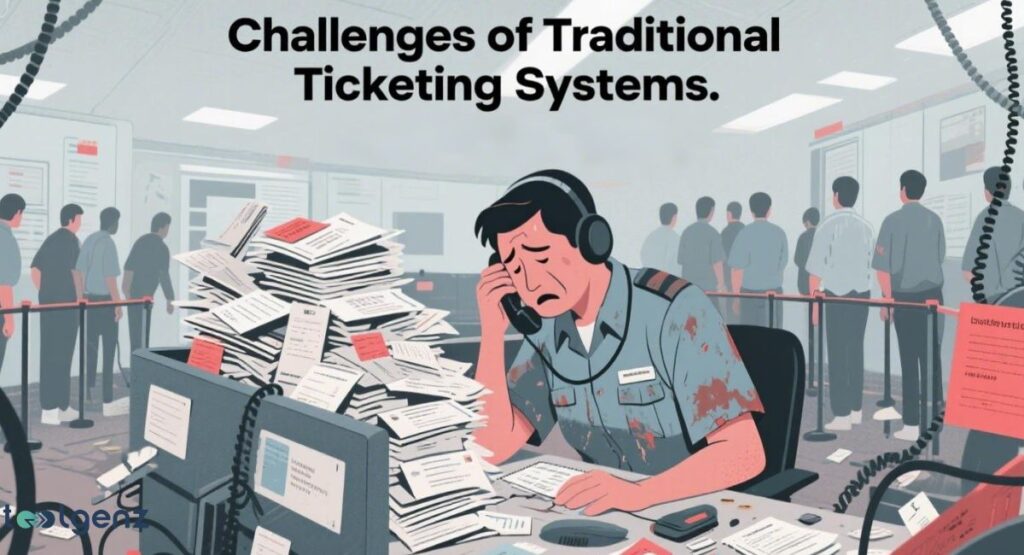
Old support systems need humans to read, sort, and respond to every ticket. This slows things down, especially when ticket volume is high. Misrouted tickets and long wait times frustrate customers.
Traditional systems also lack smart tools. They don’t have ticket classification, context-aware response generation, or self-learning AI models.
Without these, it’s hard to manage high volumes or understand customer feelings, making support slow and poor.
These systems also can’t perform real-time analytics or offer automated ticket routing, which are now must-haves in modern support environments.
When expectations go up and your tools can’t keep up, both your customers and your brand can feel the impact.
AI Ticketing Systems Challenges and How to Solve Them
Even the best systems have issues. Sometimes, AI ticketing systems can misread a support request or sound a little off in tone.
Businesses can solve this with better training data and regular updates to self-learning AI models. Over time, the AI learns and improves.
Another issue is privacy. Companies also need to make sure their systems meet U.S. data privacy laws like HIPAA and CCPA. Picking trusted platforms with strong security helps.
Integration with current systems can also be tough, but modern tools now offer better AI service desk integration and ticketing workflow optimization.
To make the most of your AI tools, keep a close eye on how they perform and use the data to fine-tune the system. This ensures continuous improvement and reduces risk in daily operations.
Best Practices for Implementing AI Ticketing Systems
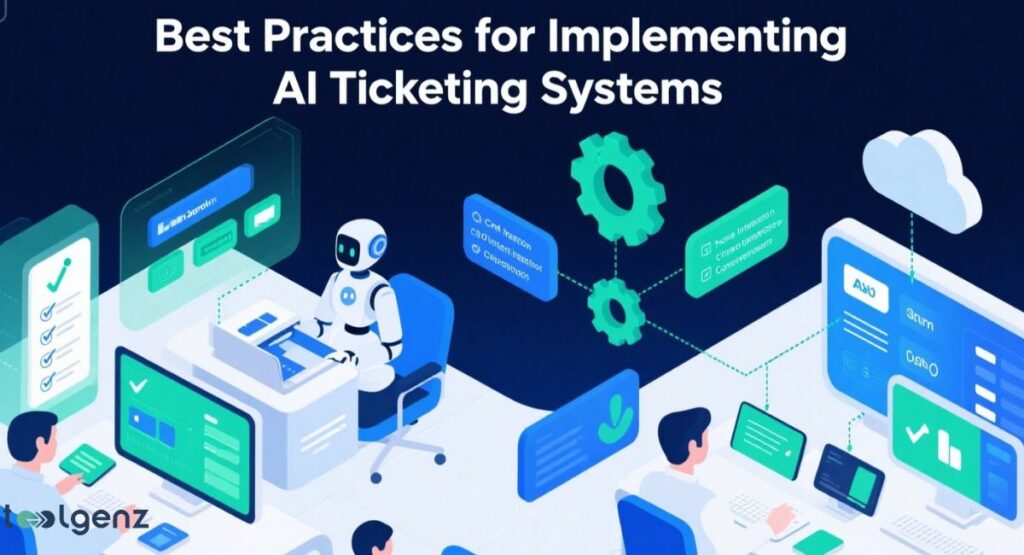
Before using AI, companies must know what they want. Set clear goals and KPIs. Decide if you want better speed, lower costs, or improved customer happiness. Then, choose the right AI-powered support system for your needs.
Begin with small, manageable tasks—like automating FAQs or simple requests—using tools like RAG and workflow automation.
Train the AI on real customer queries. Always keep a human backup and track results using predictive analytics and real-time analytics.
It’s also helpful to involve your support agents early. Teach them how to work with AI tools, so they feel confident and supported. Regular feedback loops will help refine the system and improve future performance.
How to Choose the Best AI Ticketing System for Your Business
Look for a system that fits your industry. It should offer key features like omnichannel support integration, knowledge base suggestions, and proactive issue detection. Ask these questions:
| Factor | What to Look For |
| Industry Fit | Does it support your specific workflows? |
| Ease of Integration | Can it work with your CRM or email? |
| Features | NLP, ML, real-time analytics |
| Support | Is vendor support available 24/7? |
| Security & Compliance | HIPAA, CCPA readiness |
Some of the best AI tools in the USA include Zendesk AI ticketing, Salesforce Service Cloud AI, Zoho Desk, and Freshdesk Freddy AI.
Take the Next Step with AI Ticketing
If you want to grow your business and make customers happy, it’s time to upgrade your support with AI ticketing systems.
Whether you run a startup or a large company, these tools can handle more support work, improve service, and cut costs.
Think about what your current system lacks. Try a platform that offers Generative AI, ticket triage automation, and AI help desk software. The future of support is fast, smart, and AI-powered.
Start now and give your team the tools they need to succeed.
With constant updates and smarter models, AI support systems will only get better. Don’t wait until your competitors move ahead—start exploring AI-driven solutions today.
FAQs
What is AI ticketing?
AI ticketing is the use of artificial intelligence to automatically create, route, manage, and resolve customer support tickets.
What is the meaning of AI ticket?
An AI ticket refers to a customer support request that is processed or managed using AI tools like automation, NLP, or ML.
Will TSA be replaced by AI?
While AI may enhance TSA operations with faster screening and threat detection, full replacement is unlikely due to the need for human oversight and security judgment.
What is AI ticket reselling?
AI ticket reselling uses AI tools to buy and resell event tickets by predicting demand or automating bulk purchases—often controversial or restricted.
What is an automated ticketing system?
An automated ticketing system creates, assigns, and resolves support tickets using AI and automation without needing constant human input.


